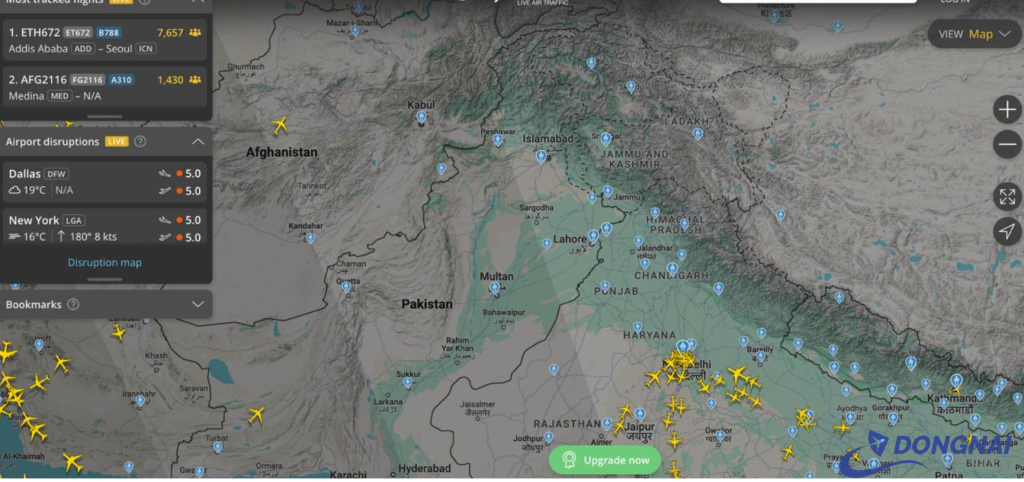India-Pakistan Tensions Disrupt Asian Aviation
Sudden Escalation of Tensions
In the early hours of May 7, military tensions erupted violently. India launched “Operation Sindoor,” targeting locations in Pakistan and Pakistan-controlled Kashmir. This was in retaliation for a terrorist attack that killed 26 people in Indian-administered Kashmir. The Indian Air Force conducted precision bombings.
Pakistan responded fiercely, claiming it shot down five Indian fighter jets. This marked the most serious clash in over 20 years. The situation escalated rapidly, and air traffic was immediately disrupted.
Airspace Falls Silent
On the morning of May 7, data from Flightradar24 drew attention. Pakistan’s airspace was nearly empty. Civilian aircraft were absent in northwestern India as well. The entire South Asia region plunged into chaos.
Flight tracking maps showed only a few flights operating. Fifty-seven international flights were forced to reroute. Airlines were thrown into confusion. Some cancelled flights on short notice. Over 20 international flights were redirected. Fifty-two flights to and from Pakistan were canceled the same morning.
Domestic flights were also affected. Indian carriers such as Air India, IndiGo, SpiceJet, and Akasa Air experienced disruptions. Some airports were closed. IndiGo shares dropped 1.8%.

Asian Airlines Respond Urgently
The incident caused widespread disruption among Asian airlines. EVA Air (Taiwan) immediately adjusted its flight schedules. One flight from Vienna had to turn back. Another from Taipei to Milan had to reroute, with a fuel stop in Vienna.
EVA Air’s stock dropped 1.7% after the announcement. The new routes were longer, increasing operational costs. Passengers faced longer delays. European destinations were heavily affected.
Korean Air redirected its flight to Dubai, choosing a route over Myanmar, Bangladesh, and India. The old route through Pakistani airspace was no longer safe. The new path required more fuel and flight time.
Thai Airways issued a similar statement. Flights to Europe and South Asia were rerouted, avoiding conflict zones.
Vietnamese Airlines Also Impacted
Vietnam Airlines confirmed its flight schedules were affected. Although details were not disclosed, the airline acknowledged adjustments. Routes to Europe that typically pass over Pakistan had to be changed, extending flight durations.
This is not the first time Vietnam Airlines has had to make emergency adjustments. However, the current situation is considered serious. Flight crews had to rotate at technical stopovers.
Chinese Airlines Take a Heavy Hit
China Airlines also faced major disruptions. Flights to London, Frankfurt, and Rome were affected. Some flights were canceled entirely. Others had to refuel in Bangkok or Prague. Crew swaps were also required mid-route.
The airline had to choose longer routes through Central Asia. This significantly increased flight time and operating costs. China Airlines’ stock dropped over 2%. Investors grew concerned about escalating risks.
Ripple Effects in Europe
Not only Asian carriers were affected. European airlines with routes to India also had to adapt. Lufthansa adjusted flight LH761 from Delhi to Frankfurt. The plane had to fly over the Arabian Sea—farther than its usual path.
Rerouting significantly raised operating costs. Passengers experienced several hours of delays. Some flights were postponed due to crew scheduling limitations.
Impact on Cargo Transport
Cargo transport also suffered. South Asia is a major transit hub. Many routes from Europe to Asia pass through the region. The closure of airspace caused widespread delays in shipments.
Import-export businesses were caught off guard. Urgent shipments had to find alternate paths. Freight costs could rise if the situation continues.
Logistics companies expressed concern over rising costs. Some importers postponed orders. This created ripple effects throughout the supply chain.
Aviation Stocks Plummet
Following the May 7 incident, many airline stocks were heavily sold. Investors feared prolonged damage. EVA Air, China Airlines, and IndiGo all saw share price drops. The instability in South Asia has shaken financial markets.
Fuel prices may also be affected. Longer routes mean higher consumption. Smaller carriers could face financial difficulties.
Prolonged and Escalating Risk
There are currently no signs of de-escalation. Both India and Pakistan have strong military capabilities. The conflict could last for days. Without diplomatic channels, the risk of escalation is high.
Airlines have not resumed normal scheduling. Tourists and businesses are waiting for updates. Some countries have advised citizens to avoid South Asia.
Conclusion
The India-Pakistan situation has shaken the entire region. Empty skies, disrupted schedules, and falling stocks. From passengers to investors, all are affected. While waiting for diplomatic efforts, airlines must adapt. This crisis underscores the vital importance of peace and stability for global trade.
Xem thêm:
Dịch vụ nhập khẩu chính ngạch hàng Trung Quốc EWX
Dịch vụ chuyển phát nhanh thành phố Hồ Chí Minh – Thanh Hóa nhanh chóng giá rẻ
Chuyển đai lưng từ Đồng Nai đi Mỹ
Ngành giày da Việt Nam trước thách thức từ Hoa Kỳ

